Freddy Krüger and Family revealed


The grave site C37/3060 in Hull General Cemetery before the plot had been cleared in late 2021 and the parts of the headstone re-united.
Freddy Krüger and family revealed
The gravestone located in Hull General Cemetery had long been hidden beneath a thick bed of ivy and other vegetation. The “Friends” of the cemetery often referred to this plot as “Freddy Krüger’s Grave. Late in 2021, the volunteers decided to clear the plot and liberate the headstone from the vegetation, in doing so they found the stone was in two pieces, one of which was lying face down. Once the two parts had been reunited the inscription was clear and read as follows: –

The inscription reveals a close link between the Raines and the Krüger families. Interestingly there is a lack of any biographical information in contrast with other memorials in the Cemetery.
After research over several weeks the true story of the Krüger and other families was revealed and we find a story of the Baltic trade between Hull and Russia, shipwreck, tragedy, and philanthropy in Victorian Hull through to the early 20th century.
Descendants of Robert Raines

Sarah Raines
Sarah was one of at least three daughters of Rev. Robert and Elizabeth Raines, she was born in 1789 and baptised in Hull St. Mary on 3rd June and died 12th July 1861. She appears to have been a lady of independent means who lived all her life in Hull and never married. In the 1851 census she is living at 7 Spring Street, head of the household with a nephew and two servants. The nephew is registered as Edward Brebim aged 19 and working as an engineer, nationality, Russian born in Riga. (I have been unable to find any family connection to Edward and the surname is untraceable and suspect).
There is an entry in Pigot’s Directory of 1828/9 of Sarah Raines having a Millinery and Dressmaking business at 1 Jarratt Street. There are no other records of her being in business in Hull and no references to her in the local press.
However, we find a detailed press report in the Hull Packet of a trial at Somerset Assizes on March 29th 1800. A certain Mrs Leigh Perrott was charged with stealing lace in the shop of Miss Gregory, in the City of Bath. Miss Sarah Raines, apprentice to Miss Gregory (milliner and owner of the shop), swore that on the 8th of August the prisoner came to the shop……. and was a witness to the theft.
In the 1861 census records we find Sarah living at 24 Pearson Street with one servant where she dies of “decay of nature” in July the same year. There is no record of any obituary, will or probate.

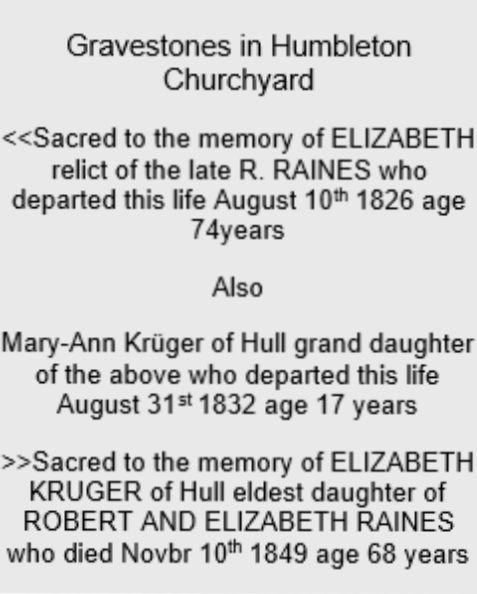

Elizabeth Raines
Sarah Raines’ sister Elizabeth was born in 1781 and died on 10th November, 1849, she is buried in Humbleton churchyard. She also had a sister Mary-Ann born in 1787 who was married to John Whitton.
Elizabeth married Francis Reimers, gentleman, on 18th February 1798 in Holy Trinity, Hull. They had two children: –
Francis Thomas born May 1800 and died January 1869 Christiana Elizabeth born December 1802
Francis Reimers died in August 1803 and buried in Hull St Mary on 30th August leaving Elizabeth a widow. His estate was valued at £100.
On the 7th March, 1810 Elizabeth marries “Jno. Frederick Krügar” in Holy Trinity, Hull. On his marriage to Elizabeth he is described as a German Teacher.
There are no official records of “John Frederick” in UK archives. His birth and death are not recorded but his marriage to Elizabeth Reimers (nee Raines) in 1810 is recorded in the Hull Trinity Parish record and there is a note of him being a clergyman in 1848 on the marriage of his son Henry Raines Krüger1 to Eleanor Blythe. There is no evidence of his presence at the marriage as a witness.
In the 1841 Census we also find Elizabeth living with her children from her first marriage at Prospect Street. Francis Thomas Reimers (her son) is head of the household, she is not described as a widow. It therefore seemed as if “John Frederick” was deceased by 1841 or had otherwise disappeared without trace.
1 There are two Henry Raines, son and grandson of Johann Friedrich Krüger
Johann Joachim Friedrich Krüger
Later I found strong evidence of family ties to St. Petersburg in Russia and that Henry Raines Krüger (his grandson) spent time in St. Petersburg with his first wife Edith who died there in the Alexander Hospital in 1886. I therefore wondered if “John Frederick” was a Lutheran clergyman of Russian descent. I found there are two Lutheran cemeteries in St. Petersburg. In the Smolenskoe Lutheran Cemetery in St. Petersburg there are several “Krügers” interred and in particular Johann Joachim Friedrich Krüger. Born 3rd July 1797 and died 3rd December 1874 age 77 years. This would seem a good match as he would have been 33 years old in 1810 on his marriage to Elizabeth.

“Rest peacefully in your tomb, your saviour will welcome you”
A further search of the cemetery records failed to find Edith, first wife of Henry Raines Krüger who died in Alexandra Hospital in 1886 although there are several other “Krügers” interred there.
It would seem that Johann lived in St. Petersburg along with other members of the family and it is likely he worked as an agent for Hull merchants in the Balkan trade with Russia.
Descendants of Johann Joachim Friedrich Krüger

Captain John Frederick Krüger
John Frederick was the youngest of Johann Friedrich’s three children, a merchant seaman, master mariner, latterly a marine surveyor and Trinity House Brother. He was called as an expert witness in several inquests into maritime accidents. He was clearly an esteemed member of the Hull community and there are numerous press reports of his close involvement, together with his brother Captain Henry Raines Krüger in the affairs of the Port of Hull Sailors’ Orphan Homes (see later).
In 1854 he married Emily Atkinson in Sculcoates, she was born in 1825 and died 28th October 1880 in Hull and is interred in Hull General Cemetery.
In the Merchant Seamen’s register (BT120), May 1836 he is Mate aged 25 on a ship belonging to Welton of Hull. Later in 1842 – 1844 he is recorded as a merchant seaman aboard the Royal William.
By 1851 he has become a Master Mariner living at 7 Spring Street. In July 1854 he was deemed qualified to be an expert witness at the Coroner’s Inquest into the loss of life resulting from the launch of the barque Dowthorpe which went awry (appendix 2).
In the 1861 census (ships at sea) he is Master of the paddle steamer PS LION along with his wife Emily, the Master’s wife aged 36 and his young son John Frederick aged 21/2.

The P S LION (pictures in Maritime Museum and Ferens Art Gallery) a Hull based paddle steamer,
626 tons, 320HP built by Brownlow & Co., Hull

During the Crimean War the ship was chartered by the government for the conveyance of troops and stores. After the war she was lengthened and converted to screw propulsion at 150HP and 690 tons, before conversion she required 650 tons of coal for the St. Petersburg voyage and now only 350 tons was required and was able to carry an extra 400 tons of cargo, and her speed increased from 6.5 to 8 knots.
On the 18th November 1861 the SS LION left Kronstadt and encountered a gale, Captain Winteringham and Captain Krüger a passenger managed to drive her ashore on the island of Gotland off the Swedish coast where she was driven to pieces in the gale. The crew and passengers managed to get ashore.
Leeds Mercury, 13th August 1888
PROBATE of the will dated 18th February 1881, of the late Captain John Frederick Krüger of Hull, Marine Superintendent, who died on the 10th June last, and was one of the oldest members of the Hull Merchant Service and an Elder Brother of the Hull Trinity House, has been granted to the executors, his sons. Mr. Henry Raines Krüger and Mr. John Frederick Krüger and Mr Joseph Atkinson. The testator devises all his real estate for sale and bequeaths the proceeds and all residue of his property to his said two sons and his daughter, Mrs Sarah Raines, as his tenants in common, the value of the personal estate being £6.613 15s 8d.
The Port of Hull Society’s Sailors’ Orphan Homes
Captain John Frederick and his brother Captain Henry Raines Krüger were prominent members of the merchant shipping community, Brethren of Trinity House and lifelong supporters of the Port of Hull Society’s Orphan Homes charity. Their dedication and generosity are recorded in a small book Lifebelt and Anchor published around 1900 recording the history of the Port of Hull Society as well as in numerous press reports of the activities of the society.


Capt. J. F. Krüger was one of the founding members of the Port of Hull Society and at the time of his death was the oldest serving member of the committee. He was connected with the earliest beginnings of the Orphanage and School. In conjunction with his brother Capt. H. R. Krüger, and Mr John Wright, he took an active interest in the enlargement of the orphanage when Mr Titus Salt gave his great contribution. (Titus Salt donated £5000 towards the cost of the new wing to accommodate an additional 100 orphans).
Capt. Krüger had been a member of the board of Trinity House since 1869, and he advocated the claims of the Orphanage with such zeal before the Trinity House brethren that they eventually became large subscribers to our funds, The generous subscriptions which, at this time were received from St. Petersburg, were also the result of Captain Krüger’s influence.
Lifebelt and Anchor, p125

Engraving reproduced from Lifebelt and Anchor
The Orphan’s Home is still in existence and is now the Park Hotel in Park Street.
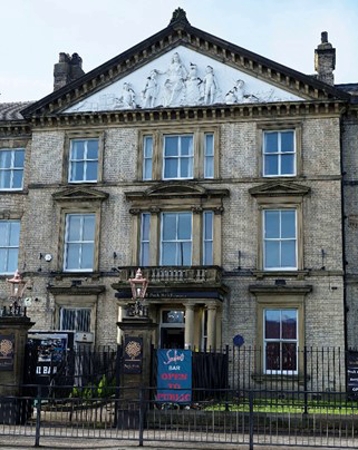
Park Street
On the façade of the former Sailor’s Orphans Home in Park Street, Commerce and Navigation are depicted providing Charity with the means to care for homeless waifs
The Book of Hull, John Markham
Captain Henry Raines Krüger
Captain Henry Raines Krüger, son of Johann Friedrich and younger brother of John Frederick, born in 1813. He died in March 1874.
In the same year (1874) the committee were saddened by the death of Mr H R Krüger, one of two brothers who were among the earliest and most zealous friends of the Society. He was a sea captain and an agent for Messrs. Brownlow & Lumsden, a prominent firm of Hull shippers at that time. His duties connected him very closely with Russia; indeed there was Russian blood in his veins. For thirty years he had served on the committee, and in work for the Orphan Home few could have been more faithful than he.
Lifeboat and Anchor, p 99
Rev. Henry Raines Krüger
Henry was the eldest son of Captain John Frederick, born in June 1857 in Sculcoates he spent most of his early life as a forwarding clerk in the shipping trade. In the 1881 census he is living with his father John Frederick at 3, Wright Street. At this stage he is still single.
On the 27th December 1883 he marries Edith Kershaw in St. Paul’s Church, Sculcoates. Shortly after we find he and his new wife have relocated to St. Petersburg, Russia where she dies in the Alexander Hospital on the 24th February 1886.
PROBATE
17th April 1886
Personal estate £306
Administration (with the Will) of the Personal Estate of Edith Krüger (wife of Henry Raines Krüger) late of 37 Louis Street in the Borough of Kingston-upon-Hull who died 24th February 1886 at the Alexander Hospital, St. Petersburg in Russia was granted at YORK under certain Specialities to the said Henry Raines Krüger of 37 Louis Street and of 9 Fish Street both in Kingston-upon-Hull. Forwarding agent and John Frederick Krüger the younger of 3 Wright Street, Kingston-upon-Hull Provision Merchant the Executors.
I can find no record of her burial in St. Petersburg or anywhere else.
Henry must have remained in St. Petersburg for several more years, presumably either working with or for his father or grandfather in their shipping business as he is not recorded in the 1891 census.
By 1893 Henry has found a new life. He marries Mary Ellen Fergie in Wigan, gains a BA and is appointed to the curacy of Cullompton on the 15th June the same year. He continued his studies, gained an MA and is appointed Rector of Jacobstowe, Okehampton, Devon.
His widow, Mary Ellen retired to Hove, Sussex and died there on 30th November 1945, her estate was valued at £2,548.
Exeter and Plymouth Gazette, 18th September 1929
Devon Clergyman’s Death
The death has taken place of the Rev. H. R. Krüger, who at one time held the curacy at Cullompton and was later presented with the living at Jacobstowe by the late Sir R. T. White-Thomson. After working in the parish for some years he was offered one of the new churches built to meet the demand of the growing population in certain parts of Plymouth. On the death of the Rev. J. W. Banks, he was presented with the living at Hatherleigh, coming to reside in the parish in 1918. In the summer of 1927, while on holiday he had a seizure which left him practically paralysed and he was persuaded by his friends to retire from active work, and a Commission granted him a pension from his living, which in the meantime was accepted by the Rev. J. C Rossiter. Much sympathy was felt for Mrs. Krüger, who has been the indefatigable nurse and constant attendant ever since her husband’s sudden illness. A knell was rung on the bells from Holsworthy, and on Sunday the Vicar made feeling reference and asked for the prayers of his congregation on behalf of Mrs. Krüger.
John Frederick Krüger (the younger) and the Apple Trade
John Frederick Krüger was the younger son of Captain John Frederick Krüger, born 18th September, 1858 in Sculcoates. We first find him aboard the PS LION with his mother and his father in command on route to Hamburg or one of the other Baltic ports. He soon becomes a shipping and merchant’s clerk, joins White & Sons fruit importers, and works his way up to senior management and a seat on the board.
John Frederick married Harriet Anne Gray on the 18th October 1888 in the Herrington Street Chapel in Sunderland.
He was evidently a valued employee and on good terms with Colonel William Lambert White, governing director of White and Sons fruit importers as he received a gift of £100 as a token of his friendship. (Hull Daily Mail, 23rd September 1930)

Yorkshire Post
Monday December 12th, 1932
- J.F. Krüger
Pioneer of the Australian Apple Trade in Hull
Mr John Frederick Krüger, who has died at his home, 23 Park Avenue, Hull, was the pioneer of the large trade in Australian Apples now done by the port. He was a director of the firm of White and Sons, Ltd fruit importers and spent 58 years with it having joined in 1874, when the business was carried on under the style of White and Son and Strutten. He went overseas a great deal for the company.
In 1912 he was in Australia and through his initiative the first direct consignment of Australian apples was sent to Hull. The trade was developed considerably, over 400,000 boxes being imported to Hull last year. At a later date he also arranged for direct shipment of apples from South Africa but owing to the difficulty of obtaining return cargoes they had to be discontinued. A dinner was given in his honour in 1924 to celebrate 50 years with the trade.
Footnote and acknowledgements
This has been a fascinating journey through the history of merchant shipping and people of the Port of Hull in Victorian England. It has been a challenge to condense all the information I have gleaned into a concise biographical story of the Raines and Krüger families, their ancestors and descendants.
I was fortunate to find the small textbook on the history of the Port of Hull Society’s Sailors’ Orphan Homes in the Carnegie Centre “Lifebelt and Anchor” (H362.73) in which I found the images of Captains J. F and H. R Krüger together with the engraving of the orphanage in Park Street.
Finally, I want to thank Karen Towner for her encouragement and advice in compiling this biography
Appendix 1
This page reproduced from Lifeboat and Anchor, the history of the Port of Hull Society showing the eminent benefactors of the Society.
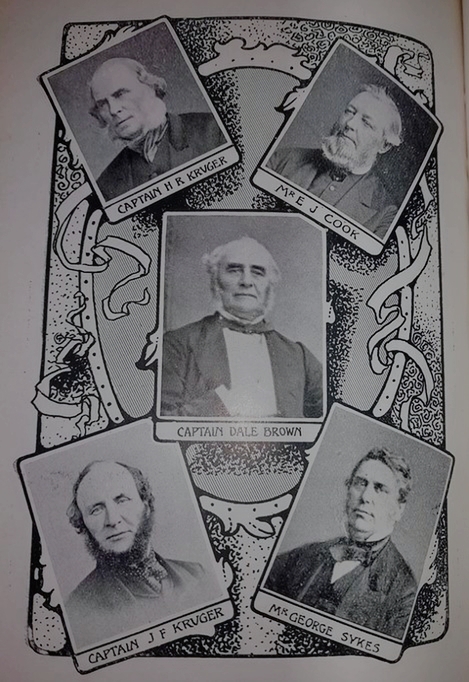
Appendix 2
Illustrated London News, July 22nd, 1854
LOSS OF LIFE AT SHIP LAUNCH
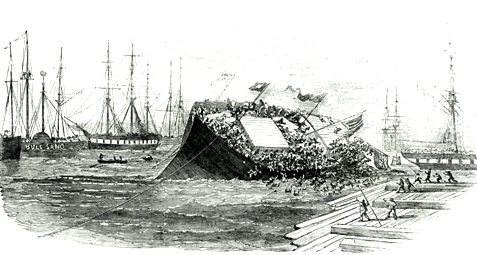
On the morning of Thursday week, Messrs. Earles, the eminent iron shipbuilders, of Hull, had arranged to launch from their yard at the east end of Victoria Dock, a very fine iron barque, named the Dowthorpe which they had built for Messrs John Beadle and Co., merchants of Hull.
This vessel is about 400 tons burthen and has on deck two poop houses. Everything was prepared, and as it was thought, every precaution taken to ensure success in the launching. Men were stationed at all posts to prevent people from getting on board the vessel, but without avail. At the time of launching there were between 300 and 400 persons on board, and of these, as many as could conceivably stand had stationed themselves on the roof of the poop houses where there was not a scrap of rope or an inch of bulwark to hold on by.
At about ten minutes past eleven o’clock the ceremony of naming the vessel Dowthorpe was performed by Miss Baird, the last of the wedges was knocked out, and the good ship glided easily and well into the water. At time it was found, we are informed, that there was too much “way” on her and some efforts were made to check her. At the same time the people on board, with the usual carelessness of danger, commenced “sallying” her – that is rushing from side to side, to make her rock in the water. Down she dipped on one side, and at this moment one of the check ropes broke, bringing the whole strain of checking on the other side, to which at the same moment the people rushed.
The combined influence of the two forces heeled the vessel completely on her beam ends, and the unfortunate people who had taken their stand on the “poops” were shot into the water one upon the other. For the moment it was thought the ship would go over altogether; but fortunately, at this moment the other check rope broke, and this, together with the lightening of the top load, by the precipitation of the people into the water, enable the vessel to right herself. In the meantime there were between fifty and sixty men and boys struggling in the water, pressing on each other to make their escape.
Happily, there were several rafts of timber floating in the dock, and upon these clambered a large proportion of the unfortunates. The loss, therefore, is not so great as might have been feared, four persons only having been dragged up. The names of the persons who have been found drowned are John Jackson, twenty-two years of age, rivet man; Joseph Lucas, fourteen, son of Mr. Lucas, hairdresser; John Coulon, twenty-four, labourer; and John Shipson, nineteen, ship-carpenter

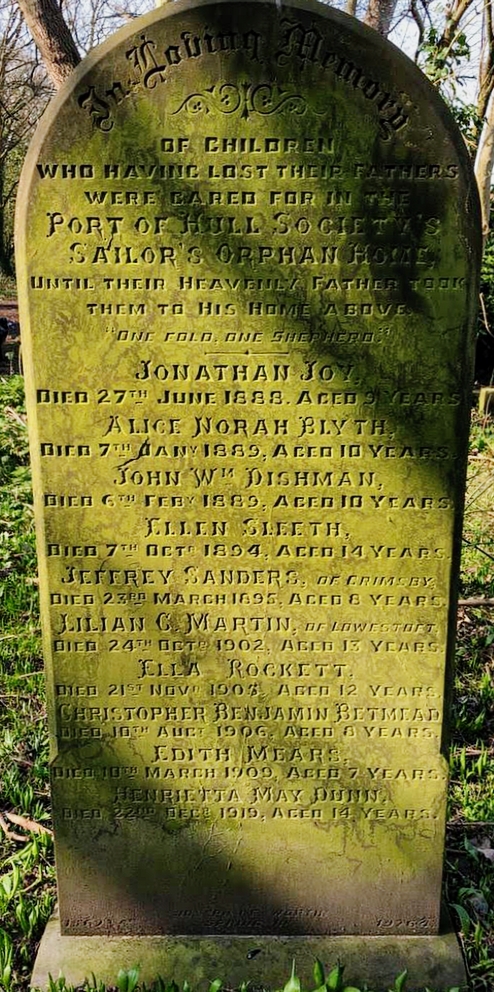
Great research Dave, I am always surprised at what stories emerge from this 14 acre site!! The Kruger’s were an important family in the history of Hull’s trading history, yet few will have heard of them!
Thanks again.
Thanks, Bill, it was very rewarding, so much history hidden away.